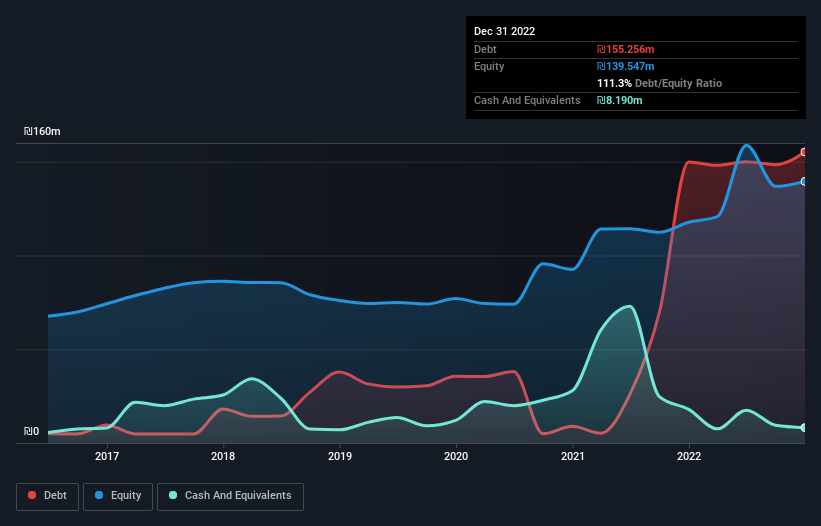- Israel
- /
- Commercial Services
- /
- TASE:SHGR
Here's Why Shagrir Group Vehicle Services (TLV:SHGR) Is Weighed Down By Its Debt Load

Legendary fund manager Li Lu (who Charlie Munger backed) once said, 'The biggest investment risk is not the volatility of prices, but whether you will suffer a permanent loss of capital.' It's only natural to consider a company's balance sheet when you examine how risky it is, since debt is often involved when a business collapses. Importantly, Shagrir Group Vehicle Services Ltd (TLV:SHGR) does carry debt. But should shareholders be worried about its use of debt?
What Risk Does Debt Bring?
Debt assists a business until the business has trouble paying it off, either with new capital or with free cash flow. If things get really bad, the lenders can take control of the business. However, a more usual (but still expensive) situation is where a company must dilute shareholders at a cheap share price simply to get debt under control. Having said that, the most common situation is where a company manages its debt reasonably well - and to its own advantage. The first step when considering a company's debt levels is to consider its cash and debt together.
Check out our latest analysis for Shagrir Group Vehicle Services
How Much Debt Does Shagrir Group Vehicle Services Carry?
As you can see below, Shagrir Group Vehicle Services had ₪155.3m of debt, at December 2022, which is about the same as the year before. You can click the chart for greater detail. However, because it has a cash reserve of ₪8.19m, its net debt is less, at about ₪147.1m.

How Strong Is Shagrir Group Vehicle Services' Balance Sheet?
The latest balance sheet data shows that Shagrir Group Vehicle Services had liabilities of ₪166.9m due within a year, and liabilities of ₪193.2m falling due after that. Offsetting this, it had ₪8.19m in cash and ₪90.2m in receivables that were due within 12 months. So it has liabilities totalling ₪261.8m more than its cash and near-term receivables, combined.
This deficit casts a shadow over the ₪70.6m company, like a colossus towering over mere mortals. So we'd watch its balance sheet closely, without a doubt. At the end of the day, Shagrir Group Vehicle Services would probably need a major re-capitalization if its creditors were to demand repayment.
We measure a company's debt load relative to its earnings power by looking at its net debt divided by its earnings before interest, tax, depreciation, and amortization (EBITDA) and by calculating how easily its earnings before interest and tax (EBIT) cover its interest expense (interest cover). This way, we consider both the absolute quantum of the debt, as well as the interest rates paid on it.
Weak interest cover of 2.2 times and a disturbingly high net debt to EBITDA ratio of 7.1 hit our confidence in Shagrir Group Vehicle Services like a one-two punch to the gut. The debt burden here is substantial. Even worse, Shagrir Group Vehicle Services saw its EBIT tank 58% over the last 12 months. If earnings continue to follow that trajectory, paying off that debt load will be harder than convincing us to run a marathon in the rain. There's no doubt that we learn most about debt from the balance sheet. But it is Shagrir Group Vehicle Services's earnings that will influence how the balance sheet holds up in the future. So if you're keen to discover more about its earnings, it might be worth checking out this graph of its long term earnings trend.
But our final consideration is also important, because a company cannot pay debt with paper profits; it needs cold hard cash. So we clearly need to look at whether that EBIT is leading to corresponding free cash flow. Over the most recent three years, Shagrir Group Vehicle Services recorded free cash flow worth 60% of its EBIT, which is around normal, given free cash flow excludes interest and tax. This free cash flow puts the company in a good position to pay down debt, when appropriate.
Our View
On the face of it, Shagrir Group Vehicle Services's EBIT growth rate left us tentative about the stock, and its level of total liabilities was no more enticing than the one empty restaurant on the busiest night of the year. But at least it's pretty decent at converting EBIT to free cash flow; that's encouraging. Taking into account all the aforementioned factors, it looks like Shagrir Group Vehicle Services has too much debt. While some investors love that sort of risky play, it's certainly not our cup of tea. There's no doubt that we learn most about debt from the balance sheet. But ultimately, every company can contain risks that exist outside of the balance sheet. These risks can be hard to spot. Every company has them, and we've spotted 5 warning signs for Shagrir Group Vehicle Services (of which 2 are a bit concerning!) you should know about.
If, after all that, you're more interested in a fast growing company with a rock-solid balance sheet, then check out our list of net cash growth stocks without delay.
New: Manage All Your Stock Portfolios in One Place
We've created the ultimate portfolio companion for stock investors, and it's free.
• Connect an unlimited number of Portfolios and see your total in one currency
• Be alerted to new Warning Signs or Risks via email or mobile
• Track the Fair Value of your stocks
Have feedback on this article? Concerned about the content? Get in touch with us directly. Alternatively, email editorial-team (at) simplywallst.com.
This article by Simply Wall St is general in nature. We provide commentary based on historical data and analyst forecasts only using an unbiased methodology and our articles are not intended to be financial advice. It does not constitute a recommendation to buy or sell any stock, and does not take account of your objectives, or your financial situation. We aim to bring you long-term focused analysis driven by fundamental data. Note that our analysis may not factor in the latest price-sensitive company announcements or qualitative material. Simply Wall St has no position in any stocks mentioned.
About TASE:SHGR
Shagrir Group Vehicle Services
Provides towing, rescue, and roadside assistance services in Israel and internationally.
Excellent balance sheet and good value.
Market Insights
Community Narratives



